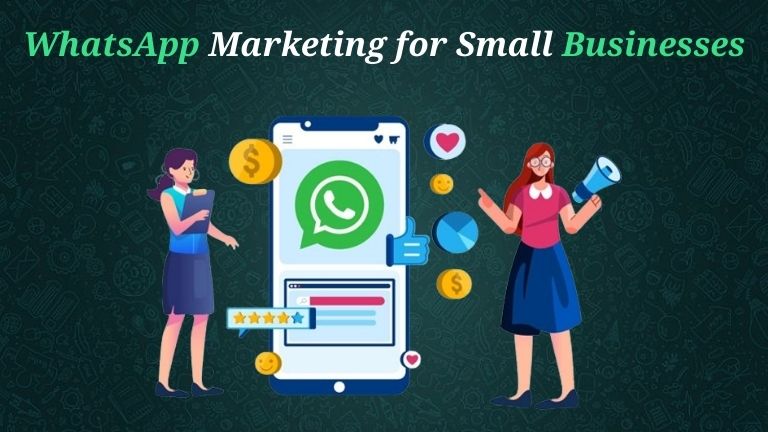
WhatsApp has become a vital marketing tool for small businesses in today’s digital age. With over 2 billion users worldwide, WhatsApp offers a direct communication line to enhance customer engagement, foster relationships, and boost sales. Here’s a guide on the benefits of WhatsApp marketing for small businesses, a budget-friendly marketing strategy, and tips for competing with bigger companies.
Why WhatsApp Marketing is Beneficial for Small Businesses
- Direct and Instant Communication: WhatsApp allows direct, real-time communication. Small businesses can respond quickly to inquiries, address concerns, and provide customer support instantly, which improves the customer experience and builds loyalty.
- High Engagement Rates: WhatsApp messages typically see high engagement, often being opened within minutes. This engagement leads to better conversion rates and more meaningful customer interactions than traditional methods like email.
- Cost-Effective Marketing: WhatsApp marketing is highly affordable, with free messaging on the platform and low-cost bulk messaging options. This is ideal for small businesses working within limited budgets.
- Personalization Opportunities: Small businesses can personalize messages by using names, referencing past purchases, or addressing specific needs. This tailored approach strengthens customer loyalty and enhances the shopping experience.
- Building a Community: WhatsApp can be used to create a brand community. Through groups or broadcast messages, businesses can engage customers, share updates, and foster a sense of belonging that sets them apart from larger competitors.
Creating a Simple, Budget-Friendly WhatsApp Marketing Strategy
- Define Your Goals: Start by setting clear objectives, such as increasing engagement, driving sales, promoting special offers, or collecting customer feedback. Defined goals help focus marketing efforts and measure success.
- Build Your Contact List: To reach customers effectively, build a strong contact list:
- Cross-Promote WhatsApp: Use your website, social media, and newsletters to encourage customers to join your WhatsApp list.
- Incentivize Sign-Ups: Offer discounts or freebies for customers who sign up.
- Lead Capture Forms: Use lead forms on your site to collect phone numbers and consent for WhatsApp messages.
- Develop a Content Plan: Plan your content to maintain consistent messaging. Include:
- Promotions: Announce discounts, new products, and special events.
- Engagement: Send personalized messages asking for feedback or offering tips related to your products.
- Educational Content: Share articles, videos, or tutorials that provide value to your audience.
- Leverage WhatsApp Business Tools: Maximize WhatsApp Business features:
- Automated Messages: Set automated greetings and away messages to improve response time.
- Quick Replies: Create templates for frequently asked questions to save time.
- Labels: Segment contacts by interest or purchase history for targeted messaging.
- Track and Analyze Performance: Regularly monitor your WhatsApp marketing performance, looking at engagement and conversion rates. Use these insights to fine-tune your approach and identify messages that resonate best.
Tips for Competing with Larger Businesses on WhatsApp
- Prioritize Customer Service: Stand out with excellent customer service. Use WhatsApp to provide timely, personalized support, which helps create a loyal customer base.
- Create Exclusive Offers: Offer exclusive deals to your WhatsApp contacts. Limited-time offers can create urgency and drive purchases.
- Foster Relationships: Use WhatsApp to engage in two-way conversations, ask for feedback, and conduct surveys. This interaction helps you understand customer preferences and tailor offerings.
- Share User-Generated Content: Encourage customers to share their experiences, photos, and reviews on WhatsApp. User-generated content builds credibility and provides social proof.
- Use Bulk Messaging Wisely: For larger lists, consider bulk messaging to reach more customers efficiently, though maintaining a personal touch is key.
- Stay Consistent and Relevant: Consistency in your messaging builds brand recognition. Stay updated on industry trends to keep your content fresh and relevant.
- Leverage Analytics Tools: Track customer responses and engagement using third-party tools if needed. This data helps refine your marketing strategy.
- Engage with Local Communities: Use WhatsApp to connect with local customers, promote community events, or support local initiatives, building goodwill and loyalty.
Conclusion
WhatsApp marketing offers small businesses a cost-effective way to engage customers and drive sales. With personalized service, relationship-building, and consistent communication, small businesses can compete with larger companies effectively. Embrace WhatsApp as part of your marketing strategy to help your business thrive in a competitive landscape.
